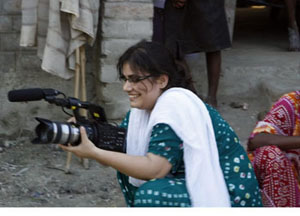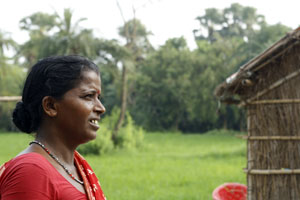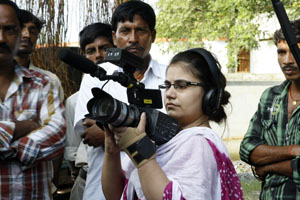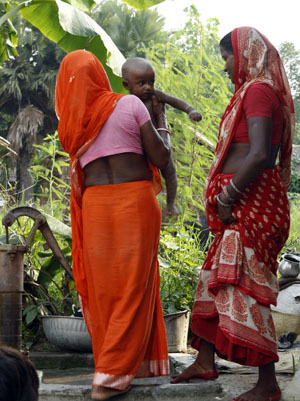Last May, UCSC graduate student Sadia Halima received the Chancellor’s Research Award for her thesis film Laal Pari/The Red Fairy, a documentary addressing women’s participation in politics at the grassroots level in rural India.
Shot in the state of Bihar, in eastern India, during the summer of 2012, the film is about the struggles and challenges of elected women leaders--exploring how they are shaping their community through their engaged participation in village councils historically comprised solely of men.
"Sadia's film is a profoundly significant piece of work,” noted UCSC film and digital media professor B. Ruby Rich.
“She corrects the Western misperception of Indian women as victims waiting for us to rescue them. Instead, she has succeeded in portraying their agency through her focus on one remarkable woman, Laal Piri, and her struggle to exercise political power on behalf of women.”
“Sadia won the trust of her subjects: they let her into their intimate domestic spaces as well as the charged spaces of political conflict," Rich added. "She never stopped filming, no matter what was being said. I am certain this documentary is going to be widely seen and used in curricula as well as screenings."
Born in India, Halima came to the U.S. for the very first time in 2011 to join the Social Documentation master’s program at UC Santa Cruz.
“In India, I was working in film and TV production, but was looking for a more rigorous academic research based program that also involved filmmaking,” said Halima. “Such a combination is rare to find, and my search led me to UC Santa Cruz…it fit me extremely well.”
“My experience in the Soc Doc program at UC Santa Cruz has been very enriching,” she added. “We have a very cooperative and collaborative work culture and immerse ourselves in each other’s projects, and I think that is the program’s most valuable asset--we learned from each other’s projects as well as from our own”
Professor Rich noted that the Social Documentation program in the Arts Division at UCSC requires all students to work with faculty on campus who are experts in their area of documentary study.
“Her advisor Megan Moodie in anthropology knows rural India well and was able to guide Sadia to deepen her own research,” said Rich. “I think that Sadia really made use of the Soc Doc model of combining substantive and creative work. She threw herself into her project with an exceptionally deep level of commitment, and it showed."
Halima said that it was a pleasant surprise to see her thesis film win the Chancellor’s Award at the Graduate Research Symposium, particularly since the honor is open to grad students from all divisions and departments on the UCSC campus.
The award money ($500) has helped me with the submission fees for film festivals, which is important for bringing my film to a larger audience,” Halima noted.
“Right now I’m trying to send my film to as many film festivals as I can, and trying to find funding to make this film into a bigger web-based project that would incorporate stories of other women like Laal Pari who are not seen in the film,” she added.
To date, Halima’s film has been officially selected to screen at UNAFF 2013 (the United Nations Association Film Festival), the Kolkata International Shorts Film Festival, and the International Experiments in Cinema festival in Albuquerque, New Mexico.






